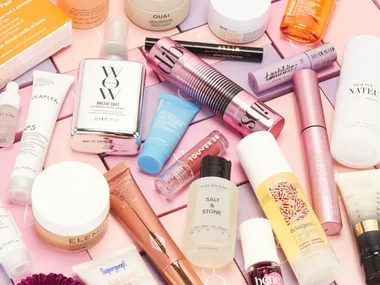Kim Kardashian is the picture of bridal bliss at her numerous public photo opportunites, but behind closed doors, she and her husband Kris Humphries have reportedly been fighting ever since their multimillion-dollar, made-for-TV wedding.
While the reality TV superstar is nagging the basketballer to give her the baby she’s always dreamed off, Kris is complaining he’s fed up with faking everything for the cameras. “Their whole life is staged,” reveals a source close to Kris. “He didn’t realise that until the wedding and has had a rude awakening. He’s sick of how their lives are planned out like a scripted TV show.”
Despite pressuring Kris, 26, to go through with the wedding, the Kardashian clan had doubts about the sportsman from the start.
Read more in this week’s Woman’s Day on sale September 19, 2011.

Kim and Kris on the rocks already?

While Kim is happy to show off her $2 million engagement ring…

Kris’ ring is no where to be seen. He has hardly worn it since the pair returned from their honeymoon.
There wasn’t a dry eye in the house when the Aussie actress married her director beau in an intimate ceremony in Florence.
When it comes to weddings, Tammin Sursok could be forgiven for expecting a last-minute objection, the reappearance of a long-lost relative, or a misbehaving bridesmaid to be caught in a compromising position. After all, the Australian actress saw many nuptials take a melodramatic turn in her breakthrough role as Colleen Carlton on daytime soapie The Young And The Restless.
When the time came to take her real-life vows, however, the day turned out to be a picture-perfect love story. “It was the most magical, breathtaking, incredible and wonderful day of my life,” Tammin, 28, beams. “People always told me that at your wedding, a lot of the time you don’t really get to speak to people and enjoy yourself. But I got to spend magical moments with every person there. I would not have done it any other way. For me, it was perfect.”
Set over three days, Tammin’s impeccably planned nuptials began with a series of dinners, cocktail parties and elegant breakfasts in the romantic Italian city of Florence. It culminated in an unforgettable ceremony, in a villa overlooking the city’s famous Duomo (cathedral) as the sun set. “I went to Italy when I was 13 years old and just fell in love with the place,” says Tammin, who now stars in US series Pretty Little Liars and has numerous film projects due in 2012. “It’s the most romantic place in the world.”
Tammin and her husband, writer and director Sean McEwen, 36, had holidayed in Italy the year before – and, like so much else in the couple’s life, something just felt right. “We fell in love with each other all over again,” she says. “We’d been together almost five years – and we went to this hotel, a villa in Florence, and said, ‘When we get married, this is where we want to do it. It’s a little piece of paradise.’ It’s the most magical place.” Going with their instincts paid off, as it did when the pair first chanced going on a date five years ago… to a fast-food joint in small-town Missouri in the US.
See more pictures of Tammin’s beautiful day and read more in this week’s Woman’s Day, on sale September 19, 2011.
The X Factor judge and his wife are bubbling over with joy at the news they’re expecting their first child.
Life has never been sweeter for Aussie chart-topper Guy Sebastian and his wife of three years, Julie Egan. An overjoyed Guy has revealed the real reason he hasn’t been able to stop smiling on the judging panel of reality show The X Factor: Jules, as Guy affectionately calls his soul mate, is 13 weeks pregnant with their first child.
Unable to contain his excitement, Guy took to Twitter last week to confirm the news.“2day we r officially out of our first trimester so it excites me 2 announce that Jules & I r expecting our first child,” the original Australian Idol winner wrote. “Cant w8 2 b parents! “Thanks to all friends, family, fans, etc for all your kind words. We love you.” But it was actually Guy’s fellow judge on The X Factor, Ronan Keating, who first confirmed the industry’s worst-kept secret. “Guy told me a while ago. I didn’t realise the news was out,” Ronan let slip on The Kyle And Jackie O Show last Monday. “That’s great. I’m really excited for them, they’re a lovely couple.”
Guy, 29, has enjoyed hit after hit here and overseas since his debut single Angels Brought Me Here shattered chart records. But there’s no doubt fatherhood is the role he’s been waiting for. Well known as a nice guy in the recording industry, Guy – who famously abstained from sex until marriage due to his strong Christian faith – has never lost sight of what matters most in life.
Sure, he won the hearts of a nation with his show-stopping performances on Idol in 2003. However, for the Malaysian-born, tattooed R&B crooner – who met his beloved Jules as a teenager in a church group in Adelaide – family, friends and, above all, his softly spoken wife, have always come first.
Read more about Guy and Jules’ news in this week’s Woman’s Day, on sale September 19, 2011.
Almost a third of overweight adults mistakenly think that their health is excellent or very good, according to a new study by the National Heart Foundation of Australia.
The heart health charity surveyed more than 12,500 people aged 30-65 and found that women were more likely to be in denial about the impact their weight has on their health than men.
“Our perception of what being healthy looks like seems to be expanding at the same rate as our waistlines,” Healthy Weight Director at the Heart Foundation Susan Anderson said.
“As being overweight becomes more common, it appears that some people no longer consider carrying extra kilos to be a threat to their health.
“In reality, being overweight or obese increases your risk of heart disease, the number one killer of Australian men and women, as well as diabetes, arthritis and some types of cancer.”
Overall, 32 percent of overweight women thought they were in excellent or very good health compared to 29 percent of overweight men. The gender gap increased to 8 percent in the 60-65 age group.
The Heart Foundation also found that a significant proportion of people still considered themselves to be in excellent health even when their doctor recommended making lifestyle changes.
“The way we view our health may be clouded by judging ourselves against others rather than against medical advice and the recommended guidelines,” Anderson said.
Almost 10 million Australian adults are now overweight or obese, with the Australian Bureau of Statistics finding that 25 percent are obese, 37 percent are overweight and 37 percent are a healthy weight.
For most people, being a healthy weight means having a body mass index (BMI) between 18.5 and 24.9, but waist circumference is also a good indicator. Women should aim for a waist measurement of less than 80cm and men for less than 94cm.
“A comprehensive approach is needed to help people make healthier choices. As well as continuing to challenge food companies to make their food healthier through our Tick Program, the Heart Foundation is encouraging federal and state government to make healthy food affordable and accessible; provide clearer labelling of unhealthy ingredients; and improve local neighbourhoods so that more families have access to parks and safe routes for kids to walk and ride to school.”
The survey also found that:
Almost a fifth of people who have been advised by their doctor to lose weight rate their health as very good or excellent.
One in six people who have been advised by their doctor to do more physical activity rate their health as very good or excellent.
More than one in six people who have been advised by their doctor to improve their diet rate their health as very good or excellent.
When it comes to red carpet glamour make-up it’s all about the lashes.
Woman’s Day beauty editor Mary Zavaglia has chosen three favourite celebrity lash looks including, Kim Kardashian, Charlize Theron and Julianne Moore, and talks us through how you can achieve them yourself.
Flick through the images of our lash before and after looks and watch our video for more on getting the look.
30 Days of Fashion and Beauty: Easy-to-follow Fashion Week trends.

Kim Kardashian

Kim Kardashian’s lash look before and after.

Julianne Moore

Julianne Moore look before and after.

Charlize Theron

Charlize Theron look before and after.
Nourish yourself from the inside out and your body will thank you for it, says accredited nutritionist Caitlin Reid.
Many of us spend hours worrying about what we look like on the outside, when really we should be spending more time focusing on our insides. Maintaining a healthy digestive system relies on a healthy balance among the trillions of bacteria that reside within our gastrointestinal tract (also known as the gut microflora). Upsetting the gut microflora can lead to health problems such as indigestion, reduced immunity and bloating.
Role of the gut microflora
Gut microflora is critical for maintaining normal gastrointestinal and immune function, as well as the normal digestion of nutrients. The gut microflora has important metabolic functions including the breakdown of dietary toxins and carcinogens, the synthesis of micronutrients, the fermentation of indigestible food substances, and the absorption of certain electrolytes and trace minerals. It also plays an important role in the production of short-chain fatty acids (SCFA), major end products of bacterial metabolism in the gut. SCFA help cells in the colon to growth and differentiate.
Microflora imbalance
A poor diet, excessive alcohol, stress, antibiotics, medications and a lack of sleep can all upset the natural balance of the gut microflora. Antibiotics kill not only the bad bacteria in the gut but also the good guys. Microflora imbalance becomes evident with symptoms of abdominal pain and irregular bowel movements.
Improving gut microflora
You can keep your gut healthy by following these tips:
Include probiotics and prebiotics: Probiotics are beneficial bacteria, found in fermented milk drinks, some yoghurts and dietary supplements, and are similar to the healthy bacteria living in the gut. Prebiotics are carbohydrates that reach the large bowel undigested. Here they stimulate the growth and activity of probiotics, keeping the gut healthy. Prebiotics are found in bananas, garlic, chicory or added as inulin to yoghurts, bread and milk-based drinks.
Boost your fibre intake: High fibre foods such as legumes, lentils, wholegrains, seeds, nuts, fruit and vegetables bulk up your stools and keep you regular. Increase your intake of fibre gradually and make sure you get plenty of water.
Reduce alcohol consumption: Alcohol can interfere with the functioning of the digestive system and irritate and inflame the stomach. Too much alcohol can lead to heartburn and ulcers. Limit alcohol consumption to no more than two standard drinks per day.
Manage your stress: Too much stress can shut down digestion as blood flow is redirected to other parts of the body. Contractions of your digestive muscles are affected and digestive secretions are decreased. Stress also causes inflammation of the gastrointestinal system making you more susceptible to infection. Find stress-reducing activities that you enjoy and include them regularly.
Exercise regularly: Exercise helps keep food moving through your digestive tract, reducing the likelihood of constipation. Include at least 30 minutes of moderate intensity physical activity on most days of the week.
When it comes to infidelity what aspect of cheating bothers men and women the most? A new study has revealed that while men focus on whether their partner had sex with someone else, woman focus on whether their partner was in love with someone else.
New research based on the US TV show Cheaters, which catches unfaithful spouses in the act, suggests that its findings could shed light on how our psychology evolved, Live Science reported.
While scientists have long suggested that men and woman tend to act differently to adultery, with men caring more about sexual infidelity and woman caring more about emotional infidelity, the explanation surrounding this is based on evolution.
Researcher Barry Kuhle, who is an evolutionary psychologist at the University of Scranton in Pennsylvania, says men want children that they know are their own, while women want a partner to care for them, not their rivals.
Until now past studies of gender reactions to jealousy have been measured on a memory or an imagination basis with participants asked about past experiences or how they would react is their partner was unfaithful.
Cheaters however, captures real-time reactions, and Kuhle believes this study of this kind being one of the only ways to observe actual jealous behaviour. On the show investigators uncover evidence of infidelity, and the producers record jealousy-fuelled interrogations of cheaters by victims.
Kuhle and his colleagues have analysed 51 episodes of Cheaters with 75 cases of victims interrogating cheaters — 45 female victims and 30 male victims. And their findings show that men usually asked more about sex and women asked more about emotion.
“The emotion of jealousy shows clear evidence of evolution’s fingerprints,” Kuhle said.
“Natural selection has designed men to be acutely sensitive to being cuckolded and women to losing their partner’s time, attention and resources. Our skulls house a Stone Age mind in a modern-day world.”
The study found that male victims asked questions about sex about 57 percent of the time, while female victims, only asked about sex 29 percent of the time. On the other hand, female victims asked about emotion with questions such as “Do you love her?” in 71 percent of cases, compared with just 43 percent for male victims.
“Actual jealous behaviour from men and women who have actually been cheated on conforms to evolutionary psychological expectations and dovetails perfectly with research done previously that asked people to anticipate how they would behave in these circumstances,” Kuhle said.
When questioned about the realness of the Cheaters episodes, after concerns regarding this work were raised Kuhle argued it is unlikely that most of the show’s 400 to 450 love triangles were staged. He said that “it would be unethical and impractical to design a true experiment in which researchers hired confederates to sleep with participants’ partners and then observed the participants’ upset at and interrogations of their partners.”
Kuhle said it was important to keep in mind that not every couple would necessarily conform to these findings.
“Every man and every woman did not conform to this pattern,” he said.
Just because you’re eating regularly doesn’t mean you’re getting all the nutrients you need. Accredited nutritionist Caitlin Reid reveals the four common nutrient deficiencies and how to stop them happening to you.
1. Calcium
Calcium is essential for strong bones and teeth and plays a vital role in blood clotting, muscle contraction and nerve impulses. Yet consumer research shows only 10 percent of Australians are getting enough. Inadequate dietary calcium means the level of calcium in our bloodstream is maintained at the expense of our bones. If calcium is continually leached from the bones, they become weak and have an increased risk of fracture. In fact, inadequate calcium is one of the reasons why every 5-6 minutes someone is admitted to hospital with an osteoporotic fracture.
Up your intake: Eat three serves of reduced-fat dairy products (or calcium-fortified soy alternatives) daily and you’ll get over 300mg of calcium with each serve. Tinned salmon and sardines are also great sources of calcium.
2. Iron
Iron deficiency is the most common nutritional deficiency worldwide. According to Australian research, 36 percent of females aged 18-35 suffer some degree of iron deficiency, while one in three Australian toddlers suffer from low iron levels. Athletes and people with chronic inflammatory conditions such as obesity and arthritis are also at risk. As iron plays an important role in transporting oxygen throughout the body, inadequate iron can lead to fatigue, lethargy and reduced work capacity. If allowed to persist, a reduced immune function and impaired cognitive function may result.
Up your intake: Include 3-4 serves of lean red meat weekly and include other iron-rich foods such as oysters, eggs and seafood. Boost iron absorption in the body by adding vitamin C-rich foods to your meals — berries to your iron-fortified breakfast cereal and capsicum to your stir-fry.
3. Iodine
Iodine is essential for brain and nervous system development yet reports dating back to 2001 show Australian’s aren’t getting enough. Children with low iodine levels may have their hearing, coordination and alertness affected, while mild iodine deficiency can impair development and cause subtle deficits in intelligence. These conditions are reversible in very young children, so it’s important to ensure they’re getting enough. In a bid to raise iodine levels in Australians, all bread bakers are required to use iodised salt in their products. Salt-free breads and organic breads are exempt from these food regulations.
Up your intake: Six oysters will give you 144µg of iodine, while a 100g sushi roll (containing seaweed) and two eggs provide you with 92µg and 18µg respectively. Iodised salt also contributes iodine to the diet, but adding extra salt isn’t the solution seeing we already eat too much. Instead replace non-iodised salt with iodised salt, wherever possible.
4. Vitamin D
While the exact prevalence of vitamin D deficiency is unknown, it has been detected in up to 80 percent of dark-skinned, veiled or unveiled women during pregnancy, up to 76 percent of elderly people in nursing homes 9 and 23 percent of younger adults. Vitamin D maintains blood calcium levels, increases calcium and phosphorus absorption, and strengthens the skeleton. New research is showing vitamin D may also be important for a healthy immune system, heart and mind.
Up your intake: While there are some dietary sources of vitamin D (oily fish, eggs, vitamin D-fortified margarine and vitamin-D fortified milks), the best source is ultraviolet (UV) rays from the sun, which helps our skin synthesis vitamin D. For most people, 5-15 minutes of daily sunlight exposure to the face and upper limbs can prevent vitamin D deficiency. Just remember to be sun smart and avoid going out in the sun without protection during the hottest part of the day.
Each morning, a large number of Australian children are leaving the house without having eaten.
Of more concern is that one-quarter go on to have soft drinks and one in 10 eat chocolate, ice-cream or potato chips as their first meal of the day.
Nutritionally, they are loading up on foods high in salt, sugar and fat, without the goodness of fibre, vitamins, minerals and other important nutrients obtained from a healthy breakfast.
Here is why eating breakfast, the most important meal of the day, is worth the effort.
Five reasons to eat breakfast:
1. Kick-start your brain: Breakfast literally means to “break the fast” since your last meal. After fasting overnight, eating a healthy breakfast restores the body’s glucose levels, the brain’s only energy source. Research shows that people who eat a balanced breakfast have better concentration and are more likely to be efficient at work.
2. Get your body pumping: Research shows that breakfast speeds up our metabolism, which helps us to burn food faster. It’s the fibre and carbohydrates in a good breakfast that help you feel fuller for longer and prevent snacking.
3. Boost your nutrient intake: Studies around the world consistently show that breakfast eaters have a better overall diet. People who eat breakfast generally have a lower fat intake, more fibre in their diet and significantly higher intakes of almost all the vitamins and minerals, especially calcium, iron and magnesium.
4. Help manage your weight: People who eat breakfast are more likely to be able to maintain a healthy weight. Studies suggest a high-fibre, high-carbohydrate breakfast helps you feel satisfied and fuller for longer, which may lead to less snacking. Plus you’re more likely to make healthier choices during the rest of the day.
5. Boost your mood: Breakfast eaters tend to have a more positive mood, are calmer and less stressed.
Related: Getting your family to eat more vegetables
Breakfast is undeniably a vital part of your day’s nutritional intake. Next time you are running out the door on an empty stomach, you should consider grabbing an on-the-go breakfast drink or a piece of fruit and some cereal to eat when you have arrived at school or work.
Alternatively, get up a little earlier and have breakfast first – that way it doesn’t get left out and you don’t feel rushed.
Your say: Do you skip breakfast?
Video: The best breakfast to eat on the run











.png?resize=380%2C285)















-(1).png?resize=380%2C285)








































